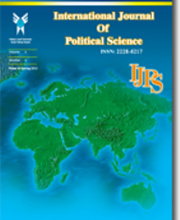
مقالات
حوزه های تخصصی:
Investigating the Effects of the Israeli Nation-state-building Process on the National Security of the Islamic Republic of Iran; and Reactions to these Effects
حوزه های تخصصی:
The Impact of US Strategy on Identity Conflicts between the Islamic Republic of Iran and the European Union
حوزه های تخصصی:
A Comparative Study on the Obama and Trump Administrations’ Foreign Policy Approaches
حوزه های تخصصی:
Political Ethnocentrism among the People of Talesh and Evaluation of the Factors affecting it
حوزه های تخصصی:
Philosophical and political components in the opinions of Soroush and Davari
حوزه های تخصصی:
A Critical Review on the Reproduction of Dominance and Gender Discrimination Relations in the Textbooks of Iran's Educational System
حوزه های تخصصی:
The Role of Government in Economic Development A case study of Iran during (2005-2012)
حوزه های تخصصی:
A Comparative Study of the Impact of Social Political Developments of the Last Century in Iran on the Political Decisions of Imam Khomeini before and after the Islamic Revolution
حوزه های تخصصی:
The Position of Good Governance in Iran from the Perspective of Human Development Indicators during the Years 2000-2010
حوزه های تخصصی:
Presenting a Public Policy Model in Cultural Planning of National Media, based on the Information Society
حوزه های تخصصی:
Investigating the Effect of Modern Diplomacy on Foreign Policy based on Constructivist Theory
حوزه های تخصصی:
The Effect of Russian Populism on the Iranian Intellectual Society (1917-1979)
حوزه های تخصصی:
With the beginning of the new era after the Renaissance, the Enlightenment and the Great Industrial Revolution in the West, the issue of the spread of new western ideas became a complex reality for all societies, including Iran, and there was no escaping this situation. Especially since the 19th century and the wars between Iran and Russia, as the first blow to the intellectual traditions of the Iranian people, the issue of transferring new ideas has become an undeniable reality for us Iranians, and this issue is mainly according to Iran's military needs due to the defeat of the Tsarist army. It was for the first time that Qajar Crown Prince Abbas Mirza came to the conclusion that he could not defend his land without using the tools of the new world and by sending a group headed by his son Khosrow Mirza, he opened the first intellectual interactions with the Western world and Russia. And this first step led to the education of a generation of Iranians who later became the initiators of modernization in Iran, and although they failed in this path, they should be considered serious in every word about the modernization of Iranians. Undoubtedly, the Russian Revolution is considered one of the greatest events in the history of the world in terms of its impact, and countless works have been produced in connection with it, but few works have been published about the influence of Russia in the 19th century on the intellectual atmosphere of Iran. which have been less expressive of this effect. Therefore, the main issue in this research is how and the specific mechanisms of the influence of political ideas on Iranian intellectuals in the late 19th century and early 20th century, a subject that naturally requires intellectual exploration and reflection in its dimensions and angles. It can open the knot of many intellectual and thought problems of Iran at that time.
Justice from the Perspective of John Rawls and Allameh Tabatabaei
حوزه های تخصصی:
Justice has always been the most basic issue and the most important ideal of man since the beginning of civilization on earth, and for this reason, humans have tried to turn it into reality. Parallel to this importance, the thinkers of every age have tried to explain the limits and gaps and realize it. Because the lack of justice in the society causes the emergence of discrimination, oppression, corruption, and the lack of public consensus, and a society based on injustice and heterogeneity emerges. As a result, in order to pass from this society and move towards a healthy society where justice is based, idealistic thoughts are created to reach the desired society. This creates schools, movements and revolutions. This process shows the importance of the fact that in the process of the evolution of civilization, human beings have always had the concern of justice in front of them and it is not limited to a specific group or nation. People everywhere and at all times have the desire to achieve justice. In this article, while examining the origin of justice in the thoughts of John Rawls and Allameh Tabatabaei, this concept was compared from the perspective of two thinkers. Rawls from the contemporary West and Allameh Tabatabaei from contemporary Islam are among the most prominent philosophers and thinkers in the world who look at the concept of justice with different intellectual bases. But their theoretical output has similarities in the field of the concept of justice. In this article, using the hermeneutic recovery method, the challenges in the thoughts of Rawls and Allameh Tabatabaei in the field of justice were investigated.